biotechrabbit™ AnyScript Reverse Transcriptase is an improved and genetically engineered MMuLV Reverse Transcriptase with reduced RNase H activity and increased thermostability. The enzyme is ultrapure and free of RNases and Nucleases known to spoil RT reactions; this makes AnyScript a perfect choice for first strand cDNA synthesis at higher temperature that MMuLV. AnyScript is active up to 55 °C with high yield and full-length cDNA product. The enzyme is tailored to be employed in both two step and one step RT-PCR and qRT_PCR with high sensitivity and specificity.
Superb sensitivity and specificity make AnyScript an ideal enzyme for fast RT reaction from low template input in diagnostics application.
|
Component |
Composition |
|
AnyScript Reverse Transcriptase |
AnyScript Reverse Transcriptase, 200 U/µl, in storage buffer containing 50 % (v/v) glycerol. |
|
5X Reverse Transcriptase Buffer |
Optimized 5X Reaction Buffer for AnyScript Reverse Transcriptase. |
|
STORAGE |
-30 °C to -10 °C (until expiry date – see product label) |
Unit Definition
One unit is the amount of enzyme activity that incorporates 1 nmole of dTTP into acid insoluble fraction in 10 minutes at 42°C when poly(A)+ RNA and oligo(dT)20 are used as template–primer.
Quality Control
Exonuclease assay
Linearized lambda/HindIII fragments are incubated with the Reverse Transcriptase in a 50 µl reaction mixture for 4 h at 37 °C. No degradation of DNA was observed.
Endonuclease/Nick Activity
Supercoiled plasmid DNA is incubated with the enzyme in a 50 µl reaction mixture for 4 h at 37 °C. No conversion of covalently closed circular DNA to nicked DNA detected.
Contamination with E. coli DNA
Absence of E. coli genomic DNA is confirmed by qPCR using a sample of the enzyme and specific primers targeting the E. coli 16S rRNA gene. No contamination detected.
RNase Assay
An RNA template is incubated with the enzyme in a 20 µl reaction mixture for 1 h at 42 °C. No RNA degradation observed.
Functional Assay
cDNA synthesis with oligo(dT) and/or Hexamer primers, followed by PCR.
Prevention of cDNA synthesis reaction contamination
RNase contamination is an exceptional concern when working with RNA. RNase A, providing most threat to RNA integrity, is a highly stable contaminant of any laboratory. To prevent RNA from degradation and to minimize possibility of contamination during cDNA synthesis; follow the guidelines below:
- Use separate clean areas for preparation of the samples and the reaction mixture.
- DEPC-treat all tubes and pipette tips or use certified nuclease-free labware with aerosol filters.
- Wear fresh gloves when handling RNA and all reagents.
- Always assess the integrity of RNA prior to cDNA synthesis in denaturing agarose gel electrophoresis.
- Use RNase free water and other reagents.
- To prevent RNA from degradation, add Ribonuclease inhibitor (optional) in to the cDNA synthesis reaction (20 units for 20 µl reaction).
Typical cDNA synthesis reaction set up
- Thaw on ice and mix very well all reagents.
- Assemble and keep all reactions on ice.
- To use time and reagents effectively, always prepare master mix for multiple reactions. For a master mix volume, always calculate the number reactions that you need plus one additional.
- Combine the following in an RNase-free reaction tube:
|
Component |
Volume |
Final concentration |
|
dNTP Mix (10 mM each dNTP) |
1 µl |
0.5 mM (each dNTP) |
|
RNase Inhibitor, 40 U/µl (optional) |
0.5 µl |
1 U/µl |
|
Oligo (dT)12–18 (10 µM) – or Hexamer Primer (100 µM) – or Gene Specific Primer (10 µM) |
2 µl 2 µl 0.2 - 2 µl |
1 µM 10 µM 0.1 - 1 µM |
|
5× Reverse Transcriptase Buffer |
4 µl |
1× |
|
RNA Template |
50 ng – 2 µg total RNA or 50–500 ng mRNA (polyA) |
|
|
AnyScript Reverse Transcriptase |
0.5 - 1 µl |
10 - 20 U/µl |
|
RNase-free water |
Variable |
|
|
Total volume |
20 µl |
|
- Mix and collect the drops by centrifuging briefly
- When using
- Hexamer Primer, incubate 10 minutes at 30°C followed by 37–50°C for 30 minutes (increase up to 60 min, if needed)
- Oligo (dT) or gene-specific Primer incubate at 37–50°C for 30 minutes (increase up to 60 min, if needed)
- Reaction temperature can be raised to 55°C (small activity reduction may occur)
- In case of higher secondary structures, perform a pre-incubation of the RNA template for 5 min at 65°C (place on ice immediately after) and/or increase the incubation time for the subsequent RT reaction (at 37-50°C)
- Inactivate the enzyme at 95°C for 5 min
- Collect the drops by spinning briefly
- Store products at –20°C or proceed to next step, like PCR or qPCR.
- Use maximum 10 µl of the cDNA synthesis reaction mix for PCR in 50 µl volume.
You may also be interested in the following product(s)
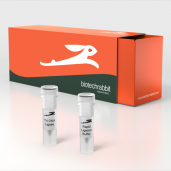
T4 DNA Ligase Rapid, 600 U/µl
Package Sizes |
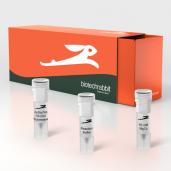
ApStarTaq™ Hot-Start DNA Polymerase, 5 U/µl
Package Sizes |
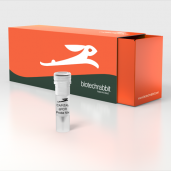
4X CAPITAL™ qPCR Probe Master Mix
Package Sizes |
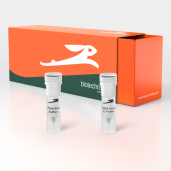
LYO-ready RB69 Gene32 Protein, 10 mg/ml
Package Sizes |
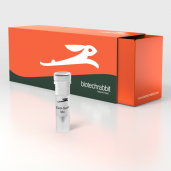
GenUP™ Exo SAP Kit
Package Sizes |
